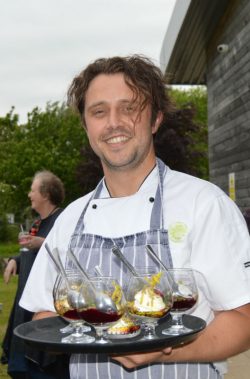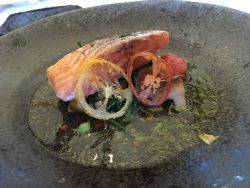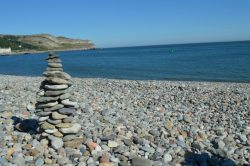 A SUNNY week in North Wales, staying on the seafront at Llandudno. Doesn’t sound much like hard work, does it? But when the Guild of Fine Food went to North Wales for three days of Great Taste judging it was a serious business for 20 food writers, chefs and food producers..
A SUNNY week in North Wales, staying on the seafront at Llandudno. Doesn’t sound much like hard work, does it? But when the Guild of Fine Food went to North Wales for three days of Great Taste judging it was a serious business for 20 food writers, chefs and food producers..
The Guild of Fine Food is based in Gillingham, from where it runs Greet Taste, the country’s leading food awards scheme, as well as the World Cheese Awards, as well as events and courses for food businesses, producers, delicatessens and independent food shops, and produces a range of publications including the Fine Food Digest.
The Great Taste Awards, with their distinctive black and gold logo, attract entries from across the UK and Ireland and from many European countries. The judging, which is done on the basis of blind tasting, takes place at Guild HQ in Dorset and at the new Guild base near Borough Market in Southwark. There are occasional visits to both Northern Ireland and the Irish Republic, and this year there was a second visit to Wales, at the invitation of the Welsh Assembly.
 The four-day stay combined judging more than 500 products, most (but not all) from Wales with a series of visits and events with Welsh food producers and catering students at Coleg Llandrillo, at Colwyn Bay, where the judging took place.
The four-day stay combined judging more than 500 products, most (but not all) from Wales with a series of visits and events with Welsh food producers and catering students at Coleg Llandrillo, at Colwyn Bay, where the judging took place.
On our first evening, the party visited Halen Mon, the world-famous sea salt business founded 20 years ago by David and Alison Lea-Wilson. We toured the salt-cote, heard about the history of the business and the variety of products from this family business, which now employs 23 people full-time.
As well as white sea salt, spiced sea salt and smoked sea salt they also produce the extraordinary smoked water. We went in sceptical – how, WHY, would you smoke water! But we came out convinced – it is a very versatile product, which a wide range of uses as a flavouring and condiment – and it makes a mean dirty martini!
Halen Mon is at the heart of a thriving Anglesey food scene with nearly 60 different producers and food businesses, including the Michelin-starred Sosban and The Old Butchers Shop Restaurant, run by Stephen and Bethan Stevens, close by on the Menai Straits.
Another Anglesey chef, the self-taught rising star Ellis Barrie, cooked our dinner at Halen Mon, with a menu that celebrated local, seasonal produce, including mussels and lamb. Ellis, one of three Scouse brothers who together run the Marram Grass restaurant, in a former campsite cafe, has just won the north west regional final of the Great British Menu. Brother Liam is front of house and has won a national Acorn hospitality award and youngest brother Conor sings and dances in stage musicals and helps at the restaurant when he’s “resting.”
 Ellis Barrie is a name and a face to watch – he’s a creative chef, quick-witted, telegenic and charming! We were very impressed with the way he responded to the challenge that two of our party had series allergies. He already knew about the coeliac but he didn’t know about the other, with a rare vinegar allergy, until the actual evening. And he managed to produce alternative delicious dishes for her.
Ellis Barrie is a name and a face to watch – he’s a creative chef, quick-witted, telegenic and charming! We were very impressed with the way he responded to the challenge that two of our party had series allergies. He already knew about the coeliac but he didn’t know about the other, with a rare vinegar allergy, until the actual evening. And he managed to produce alternative delicious dishes for her.
Coleg Llandrillo has catering courses ranging from basic skills through to degrees. Students assisted at the judging sessions and the judges ate in the college’s excellent bistro, where the food is prepared and served by Level 1 students. On the second evening some of the judges took part in a speed dating-style mentoring event for Level 2 students at the new Dylan’s bar and eatery, in the former grand Washington Hotel on Llandudno seafront.
The third and final evening was at the Welsh Food Centre at Bodnant, close to the National Trust’s famous Bodnant Gardens. The food centre is both inspiring and slightly frustrating – it is great to see redundant historic farm buildings brought back to life, but it is disappointing that excellent Welsh producers are not represented on the shelves of the farmshop.
The food centre has its own bakery, butchery and wine store and makes its own butter, cream, cheese and ice-cream from local milk. But several food producers who were judging during the week said their products were not stocked (other than at Christmas). About 85 per cent of the products in the farmshop are Welsh, but the vast majority are from the centre’s own producers.
 The quality is variable – the meat is undoubtedly excellent and the butcher skilled and helpful – but a WELSH food centre should be about the diversity, quality and innovation of Welsh food production generally, not focused on one in-house group of producers.
The quality is variable – the meat is undoubtedly excellent and the butcher skilled and helpful – but a WELSH food centre should be about the diversity, quality and innovation of Welsh food production generally, not focused on one in-house group of producers.
The visit coincided with the food centre’s fifth anniversary and a special dinner, cooked by Andrew Sheridan, who used to cook at Bodnant, and travelled up from South Wales for the evening. His menu included the rare and delicious sewin (Welsh sea trout).
Lesley Griffiths, the Welsh Assembly Cabinet Secretary for Food and Energy, spoke about the challenges posed by Brexit, and the importance and vitality of the Welsh food industry which employs 250,000 people and is probably the most dynamic sector in the country.
It was a fascinating week – we judged some wonderful food, particularly Welsh spring lamb, we were hugely impressed by the enthusiasm of the students at Coleg Llandrillo, and we met chefs and producers who are passionate about the quality, traditions and provenance of Welsh food.
 And, as Cabinet Secretary Lesley Griffiths reminded us, we were VERY lucky with the weather. “It isn’t always like this in North Wales,” she told the dinner, to much laughter.
And, as Cabinet Secretary Lesley Griffiths reminded us, we were VERY lucky with the weather. “It isn’t always like this in North Wales,” she told the dinner, to much laughter.
Pictured: The view across Llandudno Bay; David Lea-Wilson at Halen Mon; chef Ellis Barrie who catered for the visit to Halen Mon; some of the restored and converted buildings at the Welsh Food Centre; sewin, the highly sought after Welsh sea trout.